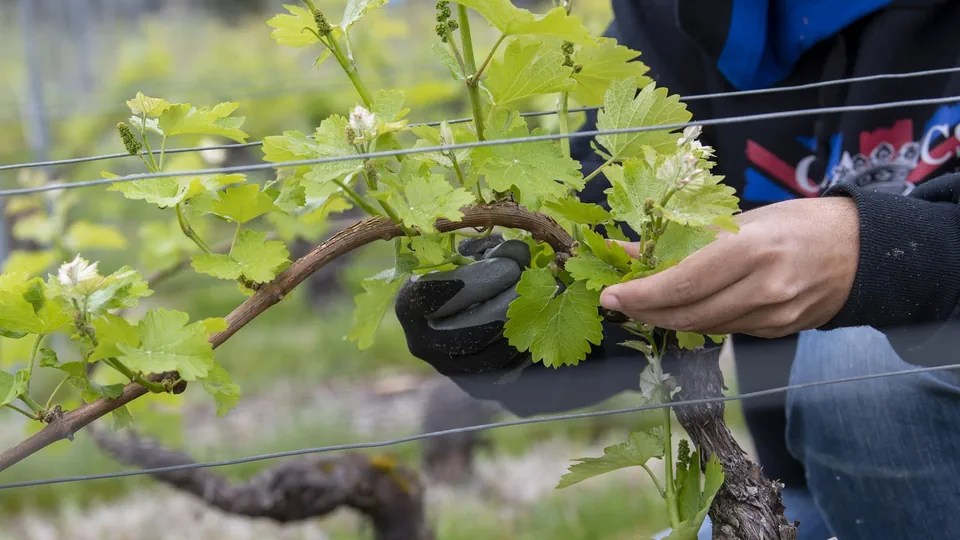
Residues of a ‘forever chemical’ found in Swiss bread and wine

Residues of trifluoroacetic acid (TFA) have been detected in bread and wine from French-speaking Switzerland, according to a joint investigation by Swiss public broadcaster, RTS, and Bon à Savoir magazine.
The molecule, widely used in agriculture and industry, is not yet regulated in either Switzerland or the European Union. Yet it may affect the reproduction of living organisms.
TFA belongs to the family of PFAS – the so-called forever chemicals – which are extremely persistent in the environment. Used as a reagent and solvent in industry, TFA is also a by-product of pesticide degradation and refrigeration gases. Highly soluble in water, it is now found throughout Switzerland but is not yet regulated.
Earlier this year, the NGO Pesticide Action Network published the results of tests on European products such as wine and bread, revealing significant levels of TFA. So what about Switzerland?
TFA present in all samples
RTS and the Bon à Savoir magazine commissioned laboratory tests in 2023 on 16 bottles of wine from French-speaking Switzerland, priced between CHF10 ($12.50) and CHF15, and 12 loaves of fresh bread from Lidl, Migros, Aldi and Coop supermarkets, using various types of flour. TFA was detected in all samples, including those labelled “organic”.
In the wines, concentrations ranged from 11 to 150 microgrammes per kilo, with an average of 58 microgrammes. In the breads, the range was 29 to 130 microgrammes per kilo, averaging 69 microgrammes. These values are about 50% lower than those found in neighbouring European countries. However, compared with the TFA levels found in tap water during a participatory survey conducted by RTS listeners – around 0.8 microgrammes per litre – they appear relatively high.

More
Subscribe to our weekly top stories
“From a public health perspective, finding TFA in drinking water or food is problematic,” explains Murielle Bochud, head of the Epidemiology and Health Systems Department at Unisanté. “We need to reduce the population’s exposure. However, these values remain well below the threshold of 0.03mg per kilo of body weight proposed by the European Food Safety Authority (EFSA).”
Authorities and industry waiting for guidance
Contacted by RTS, the Federal Food Safety and Veterinary Office (FSVO) said it is monitoring developments internationally, particularly within the European Union and the World Health Organization. It is “awaiting their directives before taking a position”.
The broadcaster also contacted umbrella organisations for winegrowers and cereal producers. A spokeswoman for Vignoble Suisse, a Swiss wine association, stressed the need for more information before acting, citing the “many potential sources of contamination”. She added that “consumers can continue to have confidence in Swiss wines – they comply with food safety standards.”
Swiss Granum, the umbrella organisation for the Swiss cereals industry, said it was unaware of the presence of TFA in bread. Its spokesperson added that the sector is not considering any measures “due to the lack of data and sufficient knowledge”.
A lack of data
Understanding the impact of TFA on the human body requires large-scale studies. However, the Swiss government recently cancelled funding for a major research project in which Bochud was participating. One of the planned topics was to measure the population’s exposure to toxic substances such as PFAS. As a result, the specific Swiss situation will remain unclear, and researchers will have to rely on international studies – even though regional differences can be significant.
It is still difficult to precisely determine the effects of TFA on human health.
“Experimental studies in animals have shown that TFA can be associated with foetal malformations and reproductive disorders. To date, however, there have been no human studies on TFA, but it can be assumed that similar effects would also be detectable in humans,” explains Murielle Bochud.
This assessment is also confirmed by Linda Bapst, head of the cantonal service for consumer protection and veterinary affairs of canton Valais. “The European Chemicals Agency recently proposed that TFA be categorised as potentially toxic to reproduction, which is often the case with this type of chemical molecule. Pregnant women or young children would therefore be at a potentially higher risk,” she said.
However, Bapst emphasised that the lack of data was “too glaring to make a definitive classification. There is a clear need at European level to drive this research forward”.
“With the levels you found, eating one slice of bread a day is far below a harmful dose – about one 180th of it – according to the limits currently set in Germany,” explains Linda Bapst, a chemist from canton Valais. “I believe the expectations of the European Union and the FSVO are justified. We need to close this scientific gap to determine the real risks of this substance,” she told Swiss public television. However, she warns that the process should not be allowed to drag on: “We need to remain credible to farmers and industry when introducing limits.”
Translated from French using DeepL/amva/ts

In compliance with the JTI standards
More: SWI swissinfo.ch certified by the Journalism Trust Initiative






























You can find an overview of ongoing debates with our journalists here . Please join us!
If you want to start a conversation about a topic raised in this article or want to report factual errors, email us at english@swissinfo.ch.